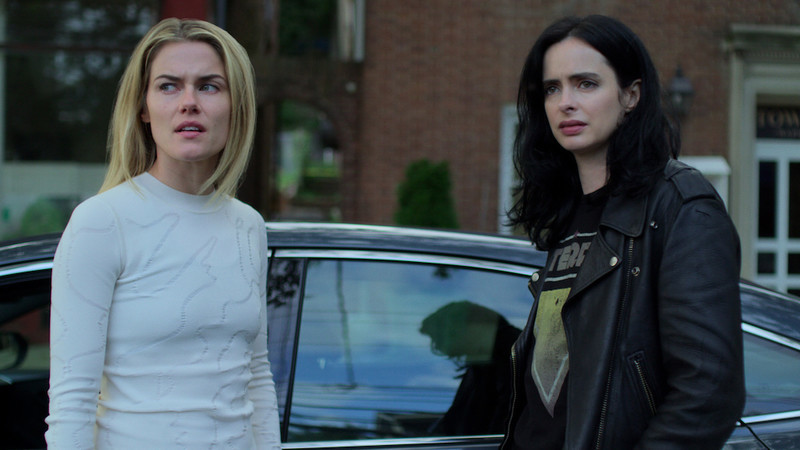This is the end of “Jessica Jones”—of the series, at least, if not the character—and its end marks the demise of the Defenders-verse, Netflix’s corner of the Marvel Cinematic Universe. Jessica was not the first to arrive, but her first season remains the high watermark of the whole shebang, a visceral, subtle story of trauma and recovery that gave Krysten Ritter the perfect role and bestowed the MCU with its first truly great villain. It was also a little overlong, a little meandering, and, occasionally, a little on-the-nose with its metaphors. Melissa Rosenberg’s series has always been an excellent exploration of some of the darker aspects of life—addiction, compulsion, the desire to control or destroy, self-hatred and self-destruction—so perhaps it’s appropriate that the series ends doing exactly what so many of its characters do: Finding new ways to repeat the same mistakes, but always striving to be better. And every so often, it succeeds.
The third season picks up with its central figures still scattered to the four winds, more or less. Jessica (Ritter) has begun, in a fumbling way, to make good on the promises she made to herself after the death of her mother at the hands of adoptive sister Trish Walker (Rachael Taylor), accepting pro bono cases and attempting to stop the bad and aid the good, inasmuch as either really exists. She does so at the prompting of Gillian, her assistant (Aneesh Sheth, a standout), still working for Alias Investigations after the departure of Malcolm (Eka Darville), who’s now up to his neck in questionable work for the resurgent, but still ailing, Jeri Hogarth (Carrie-Anne Moss). And Trish, whose desperate attempts to become super-powered herself were revealed to have worked in the second season finale, is testing her limits—a story told in an early Trish-centric episode, directed with care and style by Ritter herself in her directorial debut.

And there’s a new villain, of course. Rosenberg’s rogues have always been designed to draw out specific things in Jessica, and to look at certain kinds of bad actors in society through a supernatural lens. Salinger (Jeremy Bobb) does not have super powers. He’s just the kind of man who believes himself to be superior to others in every way, because he worked at things and is thus entitled to whatever he believes to be his due. Bobb hits dead center as the kind of man who tells the whole world that as a straight white man, he’s a victim; he’s a comments-section as killer. Sometimes, this is effective. Bobb draws his character as extremely punchable, to put it mildly. But while his actions drive much of the plot, for each and every significant character in one way or another, he’s often oddly periphery: A figure of huge significance to the plot who remains easy to hate but far from complex.
It’s disorienting, throwing the season off balance, but in the end it seems like a case of a feint being just a little too successful. The show and Bobb do such a good job in the early outings of making us believe that the main storyline of the season is Jessica versus Salinger, that when it’s ultimately revealed to be something else, it’s not a letdown precisely, but it does feel like a lot of time wasted. The true central storylines of the season are the same as those of the series as a whole: Jessica’s journey toward (and attempts to define) heroism, and her relationship with her sister. This season does the best job yet of making clear that Jessica’s willingness to see and acknowledge the gray areas in herself and in others is actually one of her greatest strengths. She may be insufferable and wildly inconsistent, but she’s also capable of empathy and forgiveness, and a very good detective to boot. “Jessica Jones” has always embraced the contradictions in its characters, but this season, that quality becomes text.

It can make the show—still stylish, often surprising, and when Ritter and occasionally Taylor are on screen, wickedly funny—a little self-serious and static. There are a lot of conversations about morality, purity of intention and how self-interest can corrupt, whether inaction is as damaging as bad action, the list goes on. Some of these are well-written, all are beautifully acted, but the frequency at which they appear proves frustrating, to say the least.
Even the dreadful “Iron Fist” contained some strong performances, but “Jessica Jones” will go down as the best-acted of the Marvel shows, and that would be true even if Krysten Ritter were the only person in the cast. (She’s got exactly one rival in that regard: “The Punisher“‘s Jon Bernthal. It would be a close thing, but she could take him.) Rosenberg’s series had its ups and downs, but Ritter remained a powerhouse throughout. There’s not a weak episode for her in the whole three-season stretch. The show works because Ritter makes Jessica’s struggles, defense mechanisms, weaknesses and regrets, and above all, her hope and her pain alike play across her face without ever making it an overly demonstrative thing. She plays Jessica as a person who’s always trying to keep her mask on, and who struggles to take it off; what we see of her is not what Ritter shows us, but what Jessica unconsciously reveals.
It’s a masterful performance, and while the first season of “Jessica Jones” remains the strongest, this run is perhaps Ritter’s best. Taylor and Moss are also quite good—the whole cast, really—but it’s Ritter’s performance that makes it. Barring some greatly unexpected reprieve from the Disney/Marvel corner, this is the end of the road for “Jessica Jones,” but if there’s any justice in the world, we’ll be talking about Ritter’s performance for years to come. I’ll miss the noir-tinged soundtrack, the sharp, even playful use of light, the one-liners, the bourbon propaganda, but above all, I’ll miss Jessica, and the performance that brought her to life.












